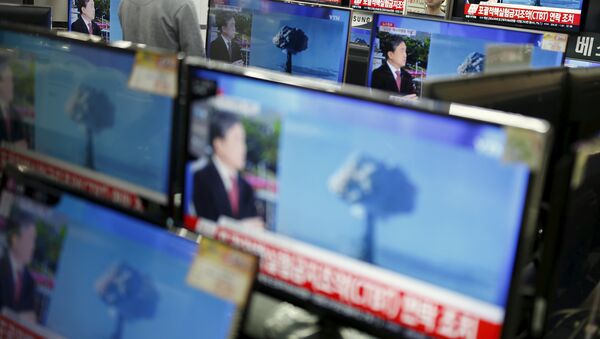WASHINGTON (Sputnik), Thomas Zimmer — Earlier in the day, Pyongyang claimed it had carried out the first test of a hydrogen bomb. Several states, especially neighboring South Korea and Japan, have subsequently called for new sanctions against the country.
“As North Korea's nuclear arsenal grows the danger of proliferation increase as well,” Columbia University Korean Studies in the Social Sciences Professor Charles Armstrong said on Wednesday.
Armstrong argued that, even if the bomb is not a hydrogen bomb, it still poses potential dangers to the Asian-Pacific region and the world.
“While it doesn't seem likely at this point that Japan or South Korea will develop nuclear weapons in response, the US nuclear presence in the region is very strong and the danger of a conflict in the region becoming nuclear is now greater than ever,” Armstrong stated.
Armstrong concluded that, if North Korea’s bomb is indeed hydrogen, the probability of the country’s destructive power will just expand.
United Nations’ sanctions against North Korea for their bomb test is almost a definite, if the country’s claims turn out to be true, Council on Foreign Relations US-Korea Policy Program Director Scott Snyder told Sputnik on Wednesday.
“Another UNSC [United Nations Security Council] resolution, then biting and fully enforced sanctions designed to reverse DPRK's [Democratic People’s Republic of Korea] current strategic policy or risk regime survival through continued defiance of the international community,” Snyder stated.
Snyder argued that North Korea’s bomb test could lead to closer cooperation between the United States and China in trying to push North Korea to stop its nuclear program.
“The main task and question centers on whether this DPRK test is a clarifying moment in Beijing that leads the PRC to overcome or put aside suspicions of the US rebalance to join a coordinated and sustained campaign to bring DPRK to its knees and pressure the existing leadership to abandon its nuclear development efforts,” Snyder said.
Snyder concluded that impact on Asian-Pacific countries will depend on their decision for a possible coordinated response to the situation.
South Korean intelligence said earlier on Wednesday the hydrogen blast in North Korea was unlikely hydrogen-based, assuming that a magnitude of an earthquake caused by the nuclear test was not high enough.



